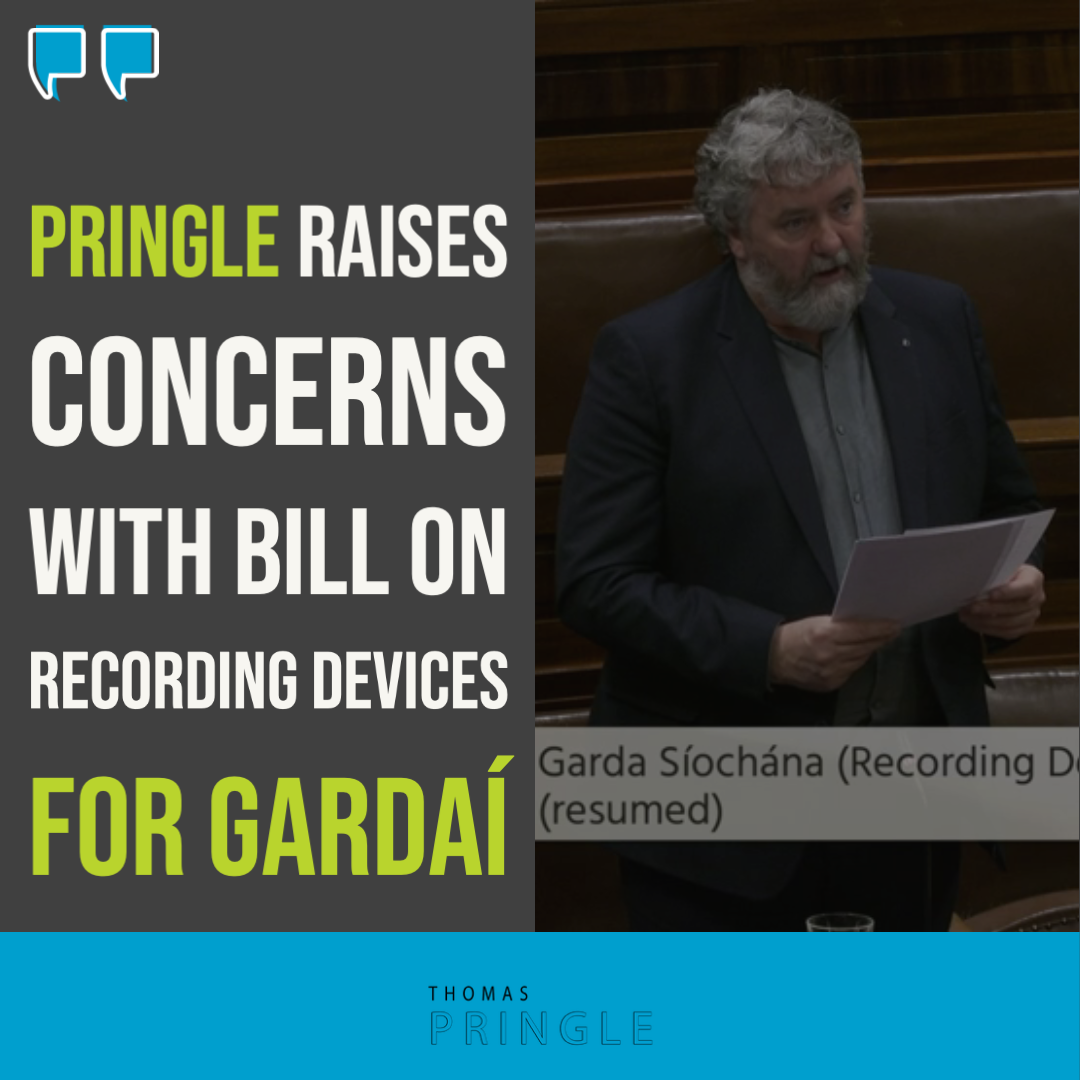- Pringle: We need a policy that recognises the importance of inshore fishing
- Pringle: Disabled people and carers face crisis of State neglect
- Pringle: Failed FF/FG housing policies forcing people to put their lives on hold
- Pringle welcomes Donegal council motion on Occupied Territories Bill: ‘We cannot stand by in the face of genocide’
Pringle raises concerns with bill on recording devices for gardaí
- Updated: 10th February 2023

Independent TD for Donegal, Thomas Pringle, raised concerns with a new bill on recording devices for An Garda Síochána, calling the bill “very important, although apparently only half-written”.
Addressing the Dáil on Thursday, Deputy Pringle said: “As I understand it, this is the first of three bills due to be introduced this year that will address reform in An Garda Síochána. There are many issues within An Garda Síochána and there is no doubt that reform is badly needed in the organisation. I find it amazing however, that instead of addressing the many areas of Garda reform required, the first thing this government has decided to prioritise is the introduction of new equipment, such as body-worn cameras, that we’re not actually 100% sure of a total need for, at the financial cost to the State and the cost of our citizens’ rights to privacy and data protection.”
The deputy was speaking on Garda Síochána (Recording Devices) Bill 2022.
Deputy Pringle said: “My biggest concern however, is the fact that the Minister for Justice indicated her intention to bring forward a committee stage amendment to the bill to provide for facial recognition technology. It is completely unacceptable to bring forward this legislation today, half-written by the government, with the intention of throwing in such important amendments at committee stage.
He said: “Minister McEntee stated clearly on the 25th of May last year that it was her ‘intention to provide for the use of facial recognition technology’. The bill was published three months later, on August 4th. The Minister had three months to write facial recognition technology into this legislation, but she didn’t. She decided instead to publish the bill without it and then add this extremely important and controversial provision at committee stage. Why is that?
“I can think of no other excuse for this other than the fact that the Government doesn’t want this raised during second stage debates in this chamber. If this is the case, then this is an incredibly sinister and disturbing move and this needs to be addressed urgently because it’s starting to become a trend,” he said.
Deputy Pringle said: “We are seeing a trend of the Government undermining the legislative process. I have been raising this continuously over the last couple of years.”
He said: “I know the government is dead set on introducing this legislation, no matter what the opposition says, but I urge the Minister to commit to a pilot project and see how things play out in the field before rolling this out nationally. Such a pilot should include robust mechanisms of operational and scientific review, with clear criteria set out that must be met before wider roll-out of this technology is initiated.
“I think this is the very least that can be done when introducing invasive and unnecessary cameras nationally,” he said.
The deputy began his remarks by referencing the Data Protection Commission, “who have outlined that An Garda Síochána have an extremely poor record of how it uses its own technology, particularly their use of CCTV.”
Deputy Pringle said: “This is particularly concerning due to the fact that there is absolutely no evidence as to why these powers are necessary. There is a complete lack of evidence from other jurisdictions to show that body cameras contribute positively to policing.”
The deputy said: “This bill is missing many important provisions, including the provision to ensure that a Garda operating a recording device is identifiable as a Garda and the provision to ensure that all guards using the device have sufficient data protection training or are suitably qualified.
“These are very important provisions that should be included in legislation such as this, that provides for the greater and more invasive monitoring of citizens,” he said.



